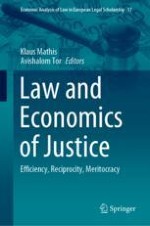2024 | OriginalPaper | Buchkapitel
7. The Relevance of Law and Economics for Practical Reasoning
verfasst von : Régis Lanneau
Erschienen in: Law and Economics of Justice
Verlag: Springer Nature Switzerland
Aktivieren Sie unsere intelligente Suche, um passende Fachinhalte oder Patente zu finden.
Wählen Sie Textabschnitte aus um mit Künstlicher Intelligenz passenden Patente zu finden. powered by
Markieren Sie Textabschnitte, um KI-gestützt weitere passende Inhalte zu finden. powered by
